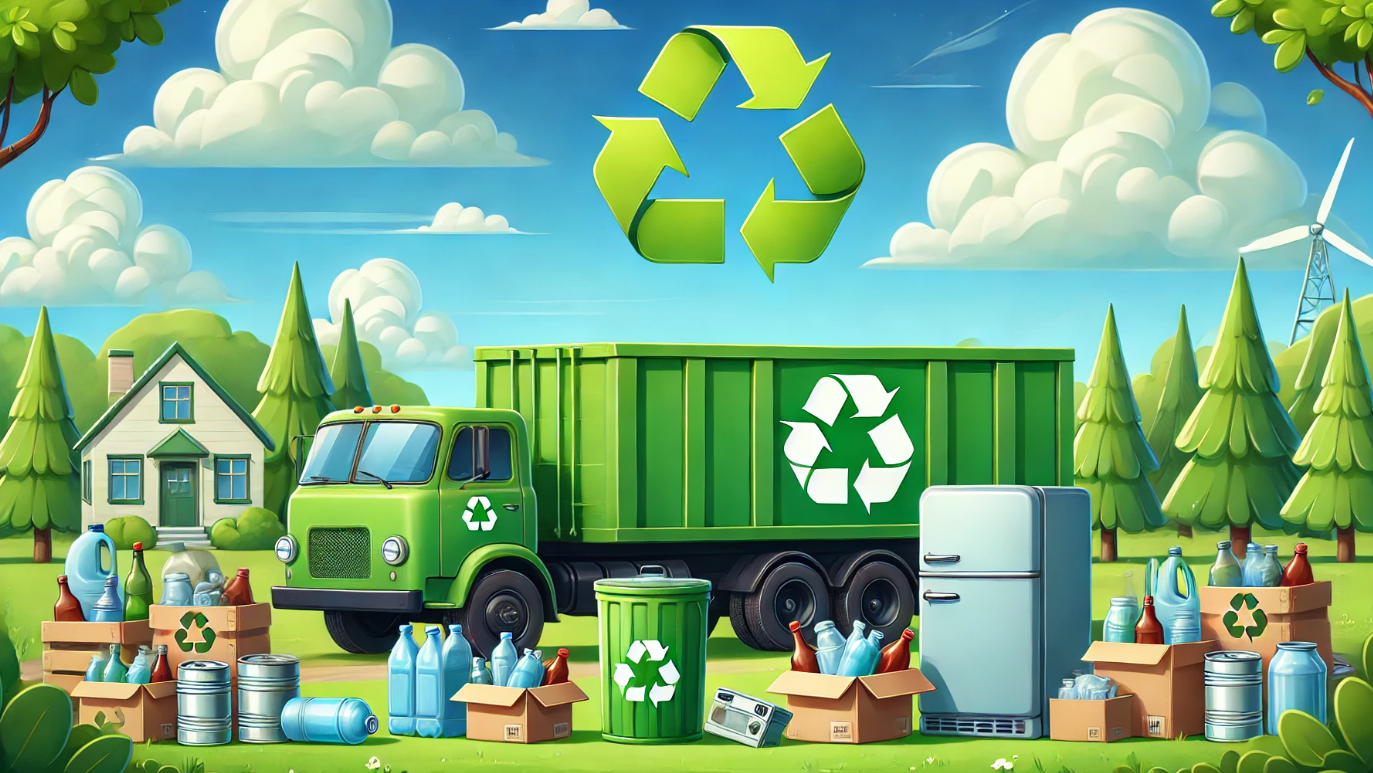
The Ultimate Guide to Eco-Friendly Junk Disposal – Clean Up with a Clear Conscience
Got old furniture, broken appliances, or general clutter piling up? If you're ready to clear out unwanted items but want to do it responsibly, eco-friendly junk disposal is the way to go. Sustainable junk disposal practices not only keep your home organized but also minimize waste, reduce pollution, and help protect natural resources. In this guide, we’ll cover how to dispose of junk responsibly, including tips on recycling, donation, and choosing the right junk removal service. Let’s dive into ways you can clean up your space and help the planet!
Why Eco-Friendly Junk Disposal Matters
Eco-friendly junk disposal offers benefits that go beyond a clutter-free home:
- Reduces Landfill Waste: When junk ends up in landfills, it contributes to pollution and overcrowding. Recycling and repurposing items help keep waste out of landfills.
- Conserves Resources: Recycling materials like metal, glass, and plastic saves energy and conserves raw materials.
- Minimizes Pollution: Hazardous materials in electronics and appliances can leach into soil and water if not disposed of properly.
- Supports Community: Donating usable items benefits local charities, helping others while keeping goods out of landfills.
Eco-Friendly Junk Disposal Options
When it comes to eco-friendly disposal, you have several options for handling different types of junk. Here’s how to dispose of common items sustainably:
1. Recycling
Recycling is essential for eco-friendly junk disposal. Items made from metal, glass, certain plastics, and electronics contain valuable materials that can be reused.
- Accepted Items: Electronics, metal appliances, cardboard, glass bottles, and paper products.
- Where to Recycle: Check with local recycling centers or waste management companies. Many cities offer curbside recycling, or you can drop items off at designated recycling facilities.
- Tip: Separate recyclable items from general junk to make disposal easier and more efficient.
2. Donation
Donating items in good condition is one of the most sustainable ways to dispose of junk. Many local charities and non-profits accept household items, furniture, and electronics.
- Accepted Items: Furniture, appliances, clothing, kitchenware, toys, and electronics.
- Where to Donate: Local thrift stores, shelters, and non-profits often accept donations. National organizations like Goodwill and Habitat for Humanity also take many household items.
- Tip: Call ahead to check donation requirements, as some organizations have restrictions on specific items.
3. Composting
For organic waste, composting is an effective way to recycle naturally. Composting is especially useful for yard waste, food scraps, and biodegradable items.
- Accepted Items: Leaves, grass clippings, food scraps (excluding meat and dairy), and certain types of paper.
- Where to Compost: Set up a compost bin in your backyard or check if your city has a composting program.
- Tip: Avoid composting items with chemicals or oils, as these can harm the composting process.
Steps for Eco-Friendly Junk Disposal
To keep junk disposal sustainable, follow these easy steps:
Step 1: Sort Your Junk
Separate items into categories: recyclable, donatable, compostable, and trash. Sorting ensures that each item goes to the right place, minimizing waste and maximizing the potential for recycling or reuse.
- Recyclables: Glass, metal, plastics, electronics.
- Donations: Furniture, appliances, clothing.
- Compostables: Organic waste like food scraps and yard waste.
- Hazardous Items: Batteries, paint, chemicals (require special handling).
Step 2: Find Local Recycling and Donation Centers
Use tools like Earth911’s recycling search to locate nearby recycling centers. Many cities have local directories or websites listing drop-off points for specific items, like electronics or hazardous waste.
Step 3: Hire an Eco-Friendly Junk Removal Service
If you’re dealing with a large load or need help with heavy items, hiring a junk removal service can make the process easier. Look for companies that prioritize recycling, donation, and responsible disposal.
Eco-Friendly Disposal Options for Common Items
| Item Type | Disposal Option | Description |
|---|---|---|
| Electronics (E-Waste) | Certified e-waste recyclers | Safe disposal for electronics |
| Furniture | Donation centers, thrift stores | Reuse items in good condition |
| Yard Waste | Composting or green waste programs | Recycles organic material |
| Hazardous Waste | Hazardous waste disposal facilities | Safe disposal to avoid contamination |
Choosing an Eco-Friendly Junk Removal Service
When hiring a junk removal company, it’s essential to choose one that aligns with your eco-friendly values. Here’s what to look for:
- Recycling and Donation Commitment
A green junk removal company will make an effort to recycle or donate as much as possible. Ask if they sort items before disposal and if they partner with local charities. - Transparent Disposal Practices
Reputable companies are transparent about where your items go. They should be able to explain their disposal process and their partnerships with recycling facilities. - Certifications and Green Initiatives
Some companies have eco-friendly certifications or participate in programs that offset carbon emissions, such as tree planting. Check if your chosen service has these initiatives in place.
Real-Life Example: Eco-Friendly Disposal for Household Items
Here’s an example of how eco-friendly junk disposal might look in practice:
Scenario: Clearing Out a Garage
You’re cleaning out your garage and find old furniture, electronics, yard tools, and a stack of cardboard boxes. Here’s how to dispose of each item responsibly:
- Furniture: Donate usable items to a local thrift store.
- Electronics: Take old electronics to an e-waste recycling center.
- Yard Tools: If in working condition, consider donating. If not, recycle metal parts.
- Cardboard Boxes: Flatten and add to your curbside recycling bin or take them to a recycling center.
By following these steps, you’re reducing waste, helping the community, and ensuring items are disposed of responsibly.
Practical Tips for Eco-Friendly Junk Disposal
- Plan Ahead for Big Cleanouts: If you have a major cleanout planned, arrange recycling, donation, and disposal options in advance to avoid unnecessary waste.
- Separate Hazardous Waste: Keep items like batteries, chemicals, and electronics separate from regular junk and dispose of them through hazardous waste programs.
- Use Online Resources: Websites like Earth911 can help you find local recycling centers for specific items.
- Consider Upcycling: Some items, like old wood or furniture, can be upcycled or repurposed. Get creative to keep items out of the landfill!
Encouraging Eco-Friendly Habits Year-Round
Eco-friendly junk disposal isn’t just a one-time activity; it’s a habit that can benefit the environment over time. Here are some ways to keep up with sustainable practices year-round:
- Declutter Regularly: Schedule seasonal cleanouts to prevent junk buildup, making it easier to recycle and donate items before they become unusable.
- Reduce Impulse Purchases: Buying less not only saves money but also reduces future junk. Purchase with intention to avoid clutter.
- Repair Before Replacing: Fixing items instead of replacing them extends their life, reducing waste and saving resources.
Organize Your Space: Staying organized helps you keep track of items and use them fully, reducing the need to discard clutter.
Frequently Asked Questions About Eco-Friendly Junk Disposal
Q: Can all electronics be recycled?
Most electronics are recyclable, but it’s essential to take them to a certified e-waste recycler. Items like computers, TVs, and phones contain materials that require special handling.
Q: What items cannot be donated?
Charities often avoid items that are broken, heavily soiled, or hazardous. This includes broken electronics, used mattresses, and certain appliances. Always check with the organization beforehand.
Q: How do I dispose of hazardous materials?
Items like batteries, paint, and chemicals require special disposal to prevent environmental harm. Many cities host hazardous waste collection events, or you can drop off items at designated facilities.
Q: Is junk removal eco-friendly?
Some junk removal companies prioritize eco-friendly disposal by sorting items for recycling and donation. Look for companies with a commitment to green practices and ask about their disposal methods.
